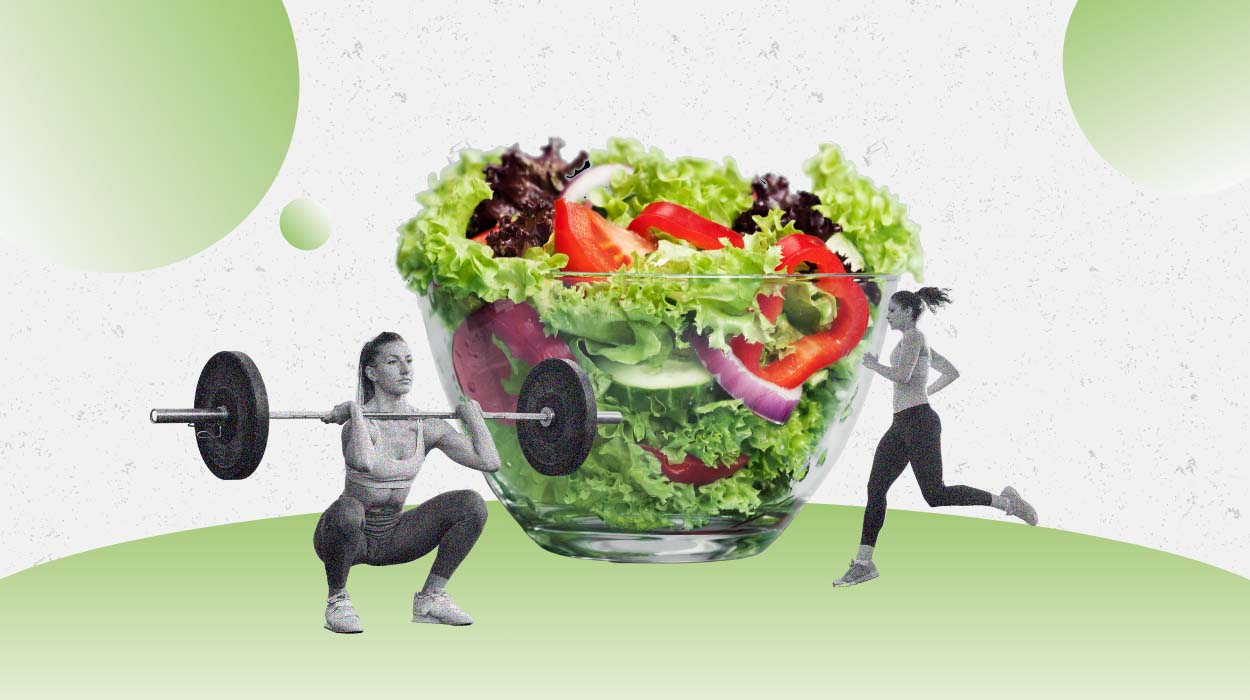 Expert's opinion
Expert's opinion
Expert's opinion
The article is a subjective view on this topic written by writers specializing in medical writing.
It may reflect on a personal journey surrounding struggles with an illness or medical condition, involve product comparisons, diet considerations, or other health-related opinions.
Although the view is entirely that of the writer, it is based on academic experiences and scientific research they have conducted; it is fact-checked by a team of degreed medical experts, and validated by sources attached to the article.
The numbers in parenthesis (1,2,3) will take you to clickable links to related scientific papers.
Keto Exercise 2024: Does Exercise Speed Up Weight Loss In Ketosis?

The high-fat, low-carb ketogenic diet (“keto”) has become increasingly popular because it has been shown to expedite weight loss. It works by causing the body to burn fat for energy rather than blood sugar (glucose).
Meanwhile, exercise has always been important in most weight-loss strategies and acts as a foundation for adding muscle.
Decades of research on exercise have discovered types of exercises that are most effective for weight loss, but does a keto diet provide sufficient energy for these exercises?
Does Exercise Speed Up Weight Loss In Ketosis?
Keto diets induce ketosis. Exercise can impact this process[1], depending on the type. Lower-intensity workouts that raise the heartbeat but do not require short, intense bursts of energy will drive the body into ketosis without putting an undue burden on it.
While you might be able to return to a former level of intensity of exercise that you sustained before keto, you should focus on lower-intensity workouts and approach returning to high-intensity training slowly over the longer term.
Keto Exercise: Exercises To Try
When you start a keto diet, the key to exercising safely and effectively is to emphasize low- to medium-intensity aerobic exercises instead of high-intensity workouts.
Jogging, biking, and swimming will be better for you, particularly as your body adjusts to the low-carbohydrate diet. Once you have adjusted to keto, you could try to return to higher-intensity forms of exercise, but exercise caution.
You might find it more difficult to do more high-intensity workouts like weight lifting or calisthenics. Ease your way into higher-intensity workouts and respect any new limits you find.
3 Best Exercises On The Keto Diet To Lose Weight
HIIT
High-intensity interval training (HIIT) provides intense workouts in which one alternates between short, high-exertion periods of exercise and longer periods of exercise at far lower levels of exertion.
For instance, a typical HIIT regime might involve a 2:1 ratio consisting of two 30-second intervals of running as fast as one can and one 15-second interval of walking, with the regime repeated to the point of exhaustion.
HIIT has tremendous weight loss benefits, but how much HIIT for weight loss will depend on the individual. Furthermore, you might find it difficult to complete the high-intensity intervals while on keto.
Be mindful of your body’s limits and don’t push past what you can do without injury.

Weight Training For Lean Muscle Mass
A key part of any workout regimen for gaining muscle will be weight training, which is a form of anaerobic exercise. There are multiple variations in weight training, but they all involve pushing the muscles to the point of failure and then allowing them to recover before pushing them again.
Over time, with resistance training, greater amounts of resistance are applied and muscles grow.
As with HIIT, weight training can be more difficult for people on a very low-carb diet like keto, particularly those involving rapid repetitions with heavy weights. Weight-training regimens that emphasize maintaining tone over building muscle mass are preferable for people while on keto.
As you begin your keto diet, focus on strength training. Remember, if the goal is to build muscle mass, work your way toward large goals slowly.

Moderate-Intensity Aerobic Exercise
The sweet spot regarding exercise for people on a ketogenic diet is moderate-intensity aerobics. Any form of exercise that increases the heart rate by 50-75% over its resting rate for 150 minutes per week qualifies as a moderate-intensity workout routine.
Multiple activities, including jogging, yoga, biking on flat terrain, and freestyle swimming at a moderate speed, meet this definition.
Not only are these exercises excellent for maintaining heart health and endurance, but they also will not be overly taxing with lower carbohydrate intake.
The Positive Effects Of A Ketogenic Diet On Athletic Exercise Performance
Increase Fat Burning
As noted, the ketogenic diet is popular because it causes the body to go into ketosis, which is a state in which it metabolizes fat for energy rather than sugar.
Exercise can result in fat burning as well causing you to expend muscle glycogen stores, which contain carbohydrates.
Therefore, research suggests combining keto and exercise[2] can increase fat burning by expanding carb-based energy stores more rapidly.
Increase Muscle Recovery
Exercises that build muscle are designed to restructure the muscle cells and fibers that make up the muscle tissue. During rest, the muscles strained during exercise undergo recovery in the form of self-repair to form new muscle fibers.
Keto diets might expedite this process, particularly because ketone bodies – which are produced from fat metabolism by the liver for energy production during ketosis.
It has been shown to speed up muscle recovery[3] by increasing the replenishment of muscle glycogen stores in the muscles.
Greater Endurance
While the highest-intensity forms of exercise might be more difficult while on keto, there is some evidence suggesting that people on a ketogenic diet might be able to engage in low- or moderate-intensity exercise for longer periods.
These findings have included results[4] seen in endurance athletes like marathon runners and multistage bicycle racers.
Furthermore, it is believed that fatty acid oxidation, a process by which the body breaks down fatty acids for energy, is increased with keto diets because of their high fatty acid content.
How To Keep Your Physical Performance At Its Best On Keto?
Keto diets vary in terms of the percentages of macronutrients (fat, carbohydrates, and protein) that go into them and the rigidity with which those percentages are maintained.
Some variations on keto are specifically designed for the type of exercise you intend to do, such as the following.
- Cyclical Ketogenic Diet (CKD): CKD requires one to maintain a keto diet for 5 days per week, followed by 2 days of greater carbohydrate intake. During the 2 days of higher carb intake, the body does not enter ketosis, and so on those days, higher-intensity workouts can be performed. This diet is popular for people looking to build muscle.
- Targeted Ketogenic Diet (TKD): The TKD is like the CKD except that carbohydrates are allowed at any time when a higher-intensity workout is planned. At other times, the normal ketogenic diet is maintained. Half an hour before a workout, 25-50 mg of carbohydrates are eaten, particularly in the forms of glucose and dextrose. Many people use glucose tablets (commonly used by people with diabetes to moderate blood sugar). In addition, the targeted keto diet seeks to avoid fat intake immediately before and after exercise.
- High-Protein Ketogenic Diet (HPKD): Specifically designed for bodybuilders and other people focusing on lifting weights, the HPKD aims for around 30% of the diet to come from protein. For a man eating a 2,500-calorie per day diet, that’s 750 calories, or a little more than 83 grams of protein per day. Given the increased demand for protein that many bodybuilding regimens require, increasing the protein intake in one’s diet makes perfect sense, though people with kidney issues should avoid high-protein diets.
4 Tips To Follow When Doing Exercises On Keto
Set Your Daily Calorie Goal
An important part of any regimen that involves keto and exercise is setting your daily calorie goal.
Bearing in mind that a pound of body weight is equal to around 3,500 calories, cutting total intake by 500 calories per day is one way to lose one pound per week. Cutting calories by 1,000 calories per day can result in 2 pounds of weight loss.
More rapid weight loss beyond that rate should only be undertaken under a doctor’s care. Remember that you can count the number of calories that you burn while exercising toward your total calorie reduction.
Apps can help to set and meet goals, so look around and find the best calorie counter app for you.

Get Enough Protein
Protein is an important part[5] of everyone’s daily intake. When exercising, it becomes even more important. If you are avoiding certain sources of protein as part of your daily diet, you can always supplement your protein with a protein powder.
There are multiple flavors of protein powder available that can be mixed with milk or other fluids, and there is a broad range of protein content among different products.
Drink More Water
Dehydration is a distressingly common problem that exercise worsens as sweating causes your body to lose more water. By drinking more water in general, you can prevent dehydration from happening.
Greater water intake can also increase your endurance and prevent your heart from working too hard as you exercise. How much water should you drink? That will depend on you, but a good rule of thumb is eight glasses per day.
Don’t Push Too Hard
It’s vital to bear in mind, particularly if you are just beginning a keto diet, that your abilities might be compromised a bit. Don’t push yourself too hard to return to previous levels of activity.
For the first few weeks, focus on lower-intensity workouts since you might experience decreased performance. Once you’ve adjusted to the keto diet, work your way slowly toward your desired levels of exercise intensity.
Supplements For Improved Exercise Performance On The Keto Diet
Protein Powder
Protein powders are available in multiple flavors and dosages and from several sources. Soy and whey are the most common sources of protein for protein powders.
If for some reason, soy and whey proteins are off limits to you, there are other protein sources used to make powders, including peas, hemp, and eggs.
Creatine
Creatine is an amino acid that commonly occurs in the muscles. Its purpose in the body is to help recycle the compounds that provide energy for the body to work.
Increasing creatine intake orally can result in greater energy stores and increased muscle mass and muscle growth.
Pre-Workout Supplements
You might try a pre-workout supplement as well. Many of these supplements contain creatine, but they also contain other amino acids and caffeine that provide energy and nitric oxide, which increases oxygen uptake and blood flow to the muscles, lengthening their endurance.
You can experiment with different supplements before choosing one for regular consumption.
Conclusion
Both keto diets and exercise are great ways to lose weight, burn fat, and stay in shape. By combining the two, you can reap the health benefits of both.
Just be sure before you begin a keto diet while already on an exercise regimen (or begin an exercise regimen while already on keto) that you start with a lower level of intensity.
Allow your body to acclimate itself to your new normal, and then slowly increase in intensity.
+ 5 sources
Health Canal avoids using tertiary references. We have strict sourcing guidelines and rely on peer-reviewed studies, academic researches from medical associations and institutions. To ensure the accuracy of articles in Health Canal, you can read more about the editorial process here
- McSwiney, F.T., Wardrop, B., Hyde, P.N., LaFountain, R.A., Volek, J.S. and Doyle, L. (2018). Keto-adaptation enhances exercise performance and body composition responses to training in endurance athletes. Metabolism-clinical and Experimental, [online] 81, pp.25–34. doi:https://doi.org/10.1016/j.metabol.2017.10.010.
- Journal of the International Society of Sports Nutrition. (2019). Effect of a four-week ketogenic diet on exercise metabolism in CrossFit-trained athletes. [online] Available at: https://www.tandfonline.com/doi/full/10.1186/s12970-019-0284-9.
- Ma, S. and Suzuki, K. (2019). Keto-Adaptation and Endurance Exercise Capacity, Fatigue Recovery, and Exercise-Induced Muscle and Organ Damage Prevention: A Narrative Review. Sports, [online] 7(2), pp.40–40. doi:https://doi.org/10.3390/sports7020040.
- Cox, P.J., Kirk, T., Ashmore, T., Willerton, K., Evans, R.D., Smith, A.A., Murray, A.J., Stubbs, B.J., West, J.A., McLure, S., King, M., Dodd, M.S., Holloway, C., Neubauer, S., Drawer, S., Veech, R.L., Griffin, J.L. and Clarke, K. (2016). Nutritional Ketosis Alters Fuel Preference and Thereby Endurance Performance in Athletes. Cell Metabolism, [online] 24(2), pp.256–268. doi:https://doi.org/10.1016/j.cmet.2016.07.010.
- Stokes, T., Hector, A.J., Morton, R.W., McGlory, C. and Phillips, S.M. (2018). Recent Perspectives Regarding the Role of Dietary Protein for the Promotion of Muscle Hypertrophy with Resistance Exercise Training. Nutrients, [online] 10(2), pp.180–180. doi:https://doi.org/10.3390/nu10020180.



